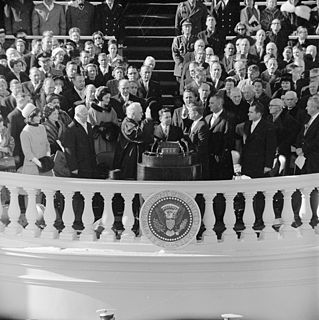
The Republic of Ecuador and the United States of America maintained close ties based on mutual interests in maintaining democratic institutions; combating cannabis and cocaine; building trade, investment, and financial ties; cooperating in fostering Ecuador's economic development; and participating in inter-American organizations. Ties are further strengthened by the presence of an estimated 150,000-200,000 Ecuadorians living in the United States and by 24,000 U.S. citizens visiting Ecuador annually, and by approximately 15,000 U.S. citizens residing in Ecuador. The United States assists Ecuador's economic development directly through the Agency for International Development (USAID) program in Ecuador and through multilateral organizations such as the Inter-American Development Bank and the World Bank. In addition, the U.S. Peace Corps operates a sizable program in Ecuador. More than 100 U.S. companies are doing business in Ecuador. Relations between the two nations have been strained following Julian Assange's bid to seek political asylum in the Ecuadorian embassy in London following repeated claims that the US government was pursuing his extradition due to his work with Wikileaks. Ecuador offered political asylum to Julian Assange in November 2012.
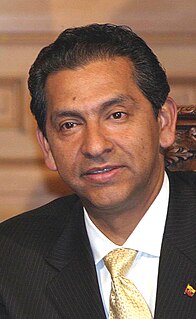
Lucio Edwin Gutiérrez Borbúa served as 43rd President of Ecuador from January 15, 2003 to April 20, 2005.

Influenza (H1N1) virus is the subtype of influenza A virus that was the most common cause of human influenza (flu) in 2009, and is associated with the 1918 outbreak known as the Spanish flu.

General elections were held in Ecuador on 15 October 2006 to elect a new President and National Congress.
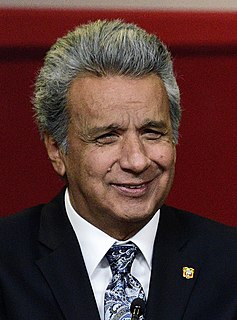
Lenín Boltaire Moreno Garcés is an Ecuadorian politician who is the President of Ecuador, in office since 2017. He was Vice President from 2007 to 2013, serving under President Rafael Correa.
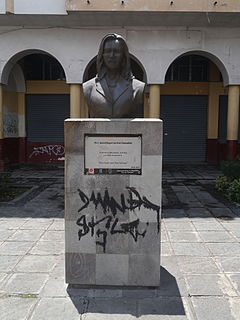
Guadalupe Larriva was an Ecuadorian politician.
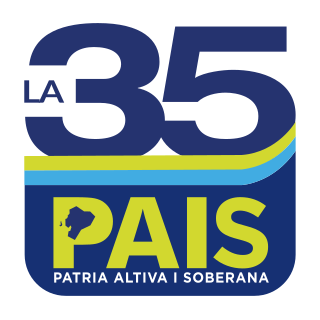
PAIS Alliance is an Ecuadorian center-left democratic socialist and social democratic political party.

A constitutional referendum was held in Ecuador on 28 September 2008 to ratify or reject the constitution drafted by the Ecuadorian Constituent Assembly elected in 2007. The new constitution was approved by 69% of voters.

Colombia–Ecuador relations refers to the diplomatic relations between the neighboring Republic of Colombia and Republic of Ecuador. The present territory of both countries was part of the Spanish Empire from the sixteenth to nineteenth centuries. After the wars for independence against the Spain led by Simón Bolívar, Ecuador, Colombia, and Venezuela became part of the Republic of Gran Colombia in 1819. Gran Colombia struggled to hold itself together as a country, and after intense civil conflicts between political factions, the union fell apart in 1830.
The 2009 flu pandemic in the United States was a novel strain of the Influenza A/H1N1 virus, commonly referred to as "swine flu", that began in the spring of 2009. The virus had spread to the US from an outbreak in Mexico.

In March and April 2009, an outbreak of a new strain of influenza commonly referred to as swine flu infected many people in Mexico and parts of the United States, causing severe illness in the former. The new strain was identified as a combination of several different strains of Influenzavirus A, subtype H1N1, including separate strains of this subtype circulating in humans and in pigs. Spain was the first country in continental Europe to report cases of swine flu, in late April 2009.

The 2009 flu outbreak in Malaysia is part of a larger flu pandemic involving a new type of influenza A virus subtype H1N1 virus. As of 11 August 2009, the country has over 2,253 cases, beginning with "imported" cases from affected countries, including the United States and Australia from 15 May 2009 onwards, and the first identified local transmission on 17 June 2009. From 12 August, the Malaysian Health Ministry said that it had discontinue officially updating the total number of H1N1 cases within Malaysia in line with guidelines issued by the World Health Organization. As of 21 August 2009 the unofficial number of cases reported in the media is 5,876 so far. The first death related to the A(H1N1) virus was reported on 23 July 2009 and so far there have been 78 deaths reported. On 6 July 2009 Malaysia announced that it was shifting from containment to mitigation to tackle the spread of the virus. The federal government has declared a national health emergency in Malaysia because of the A(H1N1) outbreak and is considering imposing a health curfew similar to the week-long shutdown of non-essential services and industries in Mexico.

The foreign policy of the Rafael Correa administration was the policy initiatives towards other states by the former President of Ecuador, as differed to past, or future, Ecuadorian foreign policy. Correa's foreign policy was somewhat similar to that of the other leaders of the Bolivarian Alternative for the Americas (ALBA) such as Hugo Chavez and Evo Morales. This entailed a rough division between relations with other states of the Americas and the rest of the world.

The 2010 Ecuador crisis took place on 30 September 2010, when elements of the National Police blockaded highways, occupied the National Parliament, blocked the Mariscal Sucre International Airport in Quito and the José Joaquín de Olmedo International Airport in Guayaquil, and took over TV Ecuador's station, in what they claimed was a strike to oppose a government-sponsored law that supposedly reduced their benefits. Unrest and looting was reported in seven provincial capitals of the country due to the lack of law enforcement.
The 2012 Ecuadorian protests was a series of demonstrations by indigenous peoples who oppose the copper mining concessions in the province of Zamora-Chinchipe. On 22 March, the protesters reached the capital Quito to be met with counter protesters and warnings from the government and President Rafael Correa.
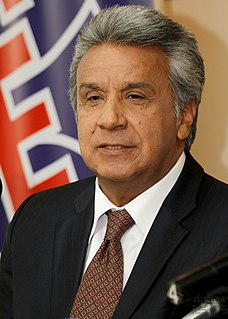
General elections were held in Ecuador on 19 February 2017 alongside a referendum on tax havens. Voters elected a new President and National Assembly. Incumbent President Rafael Correa of the PAIS Alliance was not eligible for re-election, having served two terms. In the first round of the presidential elections, PAIS Alliance candidate Lenín Moreno received 39% of the vote. Although he was more than 10% ahead of his nearest rival, Guillermo Lasso of the Creating Opportunities party, Moreno was just short of the 40% threshold required to avoid a run-off. As a result, a second round was held on 2 April. In the second round Moreno was elected President with 51.16% of the vote.
Emilio Palacio is an Ecuadorian journalist. Palacio was granted political asylum in the United States in 2012. He is the half-brother of former president of Ecuador Alfredo Palacio.

Although China's economic influence is growing rapidly throughout Latin America, it is perhaps most evident in Ecuador where it enjoys a near-monopoly of crude exports. Critics of Ecuadorian President Rafael Correa say that the Chinese influence has gone too far and threatens national sovereignty while indigenous peoples' rights and biodiversity could be severely harmed because of Ecuador's oil commitments to China.
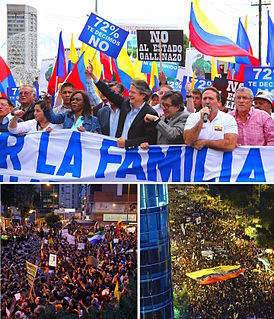
The 2015 Ecuadorian protests were a series of protests against the inheritance tax laws introduced by Ecuadorian President Rafael Correa. The protests began during the first week of June; becoming more organized and growing to hundreds of people on 8 June 2015. Since then, hundreds of thousands of Ecuadorians protested throughout Ecuador against President Correa and the controversial inheritance tax laws he introduced. The opposition and demonstrators protested stating that Correa wanted to follow "the same path as Venezuela’s government", creating a "criminal war of classes" while President Correa stated that the protests were aimed at destabilizing the government and such measures were for combatting inequality.


